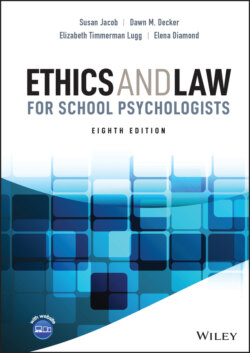Читать книгу Ethics and Law for School Psychologists - Susan Jacob - Страница 25
The NASP’s Principles for Professional Ethics
ОглавлениеThe NASP’s Principles for Professional Ethics was first adopted in 1974 and revised in 1984, 1992, 1997, 2000, 2010, and 2020 (see Jacob et al., 2021, for a brief history of the early development of the code). The 2020 Principles for Professional Ethics is reprinted in Appendix A.4 The NASP’s code of ethics focuses on the special challenges of school-based practice. For the purposes of the code, school-based practice is defined as “the provision of school psychological services under the authority of a state, regional, or local educational agency” whether the school psychologist “is an employee of the schools or contracted by the schools on a per case or consultative basis” (NASP, 2020, Definition of Terms as Used in the Principles for Professional Ethics, p. 415 ).
The team of NASP members responsible for drafting the 2020 revision of the Principles for Professional Ethics shared a commitment to ensuring that the code, like its precursors, would address the unique circumstances associated with providing school-based psychological services and would emphasize protecting the rights and interests of school children and youth (NASP, 2020, p. 39). More specifically, the 2020 code, like its precursor, is based on the following special challenges of school-based practice6 :
School psychologists must “balance the authority of parents to make decisions about their children with the needs and rights of those children, and the purposes and authority of schools.” Within this framework, school psychologists consider “the interests and rights of children and youth to be their highest priority in decision making, and act as advocates for children” (NASP, 2020, p. 39, Standard III.2.3; also Russo, 2018).
The mission of schools is to educate children, maintain order, and ensure pupil safety (Burnside v. Byars, 1966, p. 748). As school employees, “school psychologists have a legal as well as an ethical obligation to take steps to protect all students from reasonably foreseeable risk of harm” (NASP, 2020, p. 39; also Russo, 2018).
As school employees, school psychology practitioners are state actors, that is, their actions are seen to be an extension of the state’s authority to educate children (Russo, 2018). This creates a special obligation for school psychologists to know and respect the rights of schoolchildren under federal and state law (NASP, 2020, p. 39).
Like other mental health practitioners, school psychologists often provide assessment and intervention services within the framework of an established psychologist–client relationship. However, at other times, as members of a school’s instructional support team, school psychologists may provide consultative services to student assistance teams, classrooms, schools, or other recipients of service that do not fall within the scope of an established psychologist–client relationship (NASP, 2020, p. 41).
Recent years have witnessed growing interest in better protection of sensitive student information. Partly as a result of changes that have occurred in health care settings, many parents now expect greater control regarding disclosure or nondisclosure of sensitive health and mental health information about their child, even when information is to be shared internally in the school setting (Gelfman & Schwab, 2005a).
“School-based practitioners work in a context that emphasizes multidisciplinary problem solving and intervention” (NASP, 2020, p. 39).
The NASP’s 2020 code of ethics is organized around four broad ethical themes: Respecting the Dignity and Rights of All Persons; Professional Competence and Responsibility; Honesty and Integrity in Professional Relationships; and Responsibility to Schools, Families, Communities, the Profession, and Society. These themes were derived from the literature on ethical principles (e.g., Bersoff & Koeppl, 1993; Prilleltensky, 1997; Ross, 1930) and other ethical codes, especially that of the Canadian Psychological Association (CPA, 2017 ). The four broad themes “are aspirational and identify fundamental principles that underlie the ethical practice of school psychology” (NASP, 2020, pp. 40–41). Each of the four ethical themes subsumes guiding principles. The guiding principles help explain ways in which broad ethical principles apply to professional practice. Guiding principles are to be considered in ethical decision making but, because their purpose is to identify ethical considerations associated with practice situations, the guiding principles are not enforceable (pp. 40–41). The guiding principles are further articulated by multiple specific enforceable standards of conduct. As much as feasible, these standards identify actions (or failures to act) that the profession considers ethical or unethical conduct. The NASP will seek to enforce the standards in accordance with their Ethical and Professional Practices Board Procedures ([EPPB], 2018) (NASP, 2020, p. 41). The broad ethical themes, guiding principles, and associated enforceable standards of conduct in NASP’s ethics code will be discussed in more detail in this and subsequent chapters.
